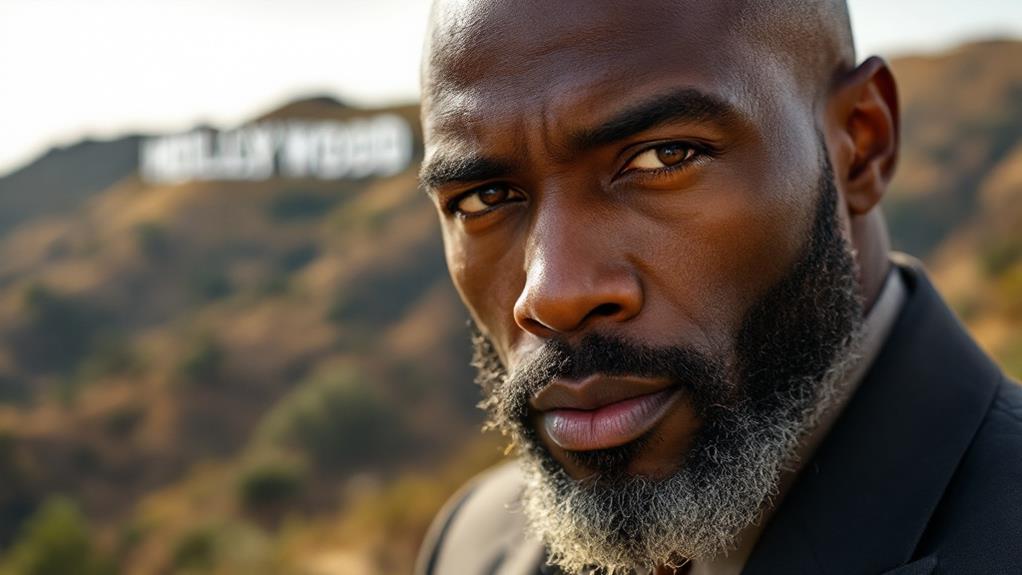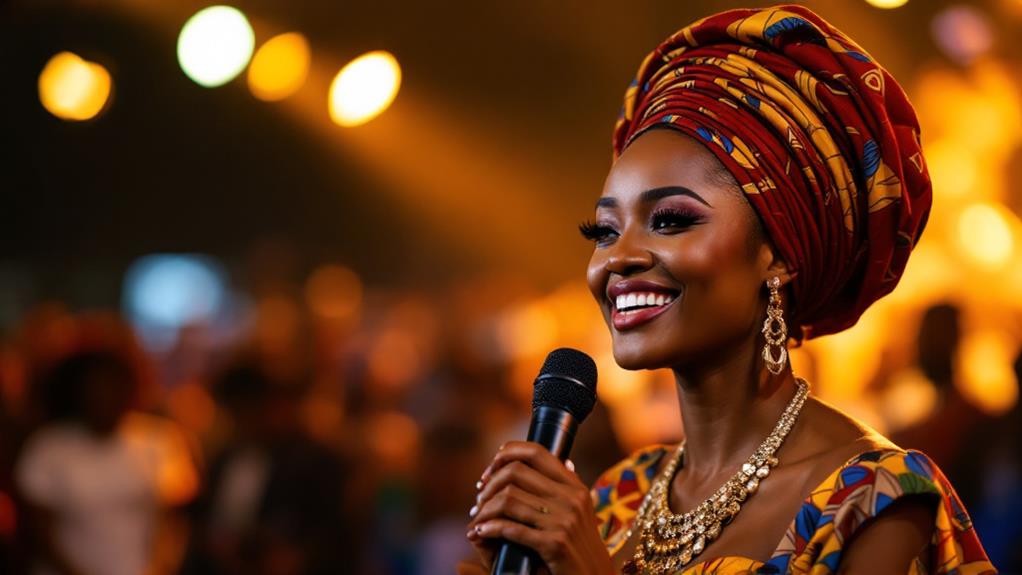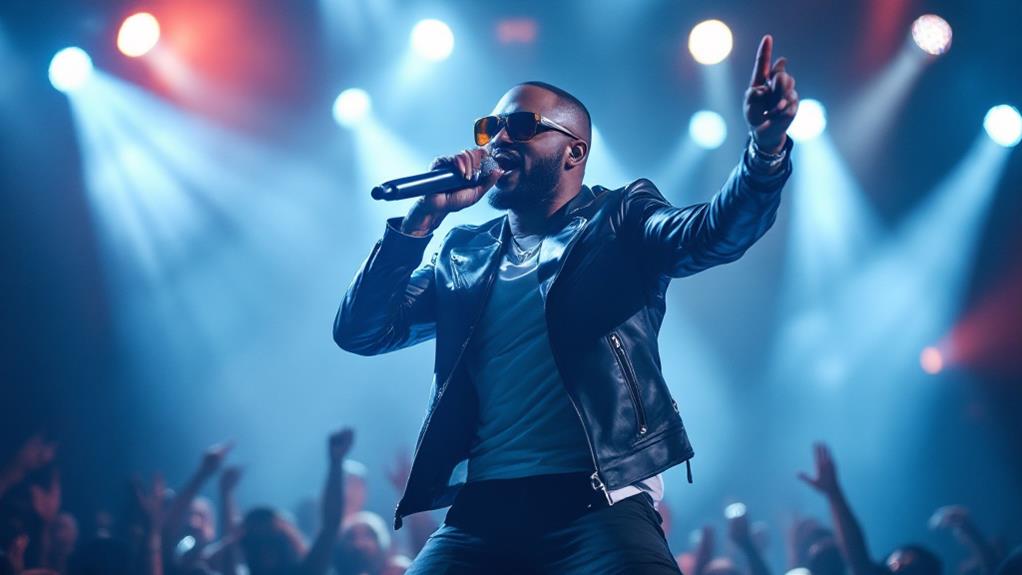Nigerian Rap Music: Leading Artists and the Sound That' s Taking Over
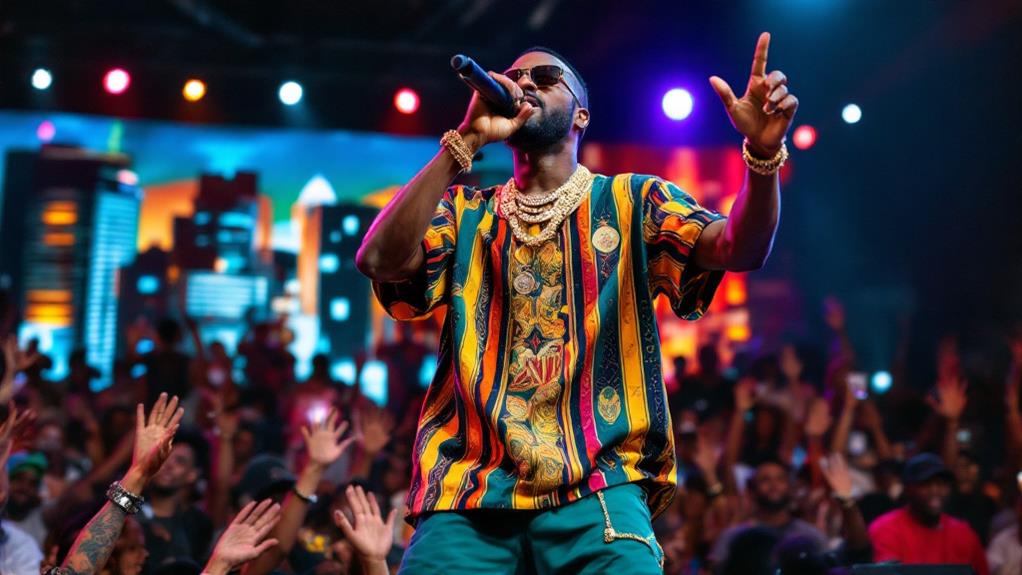
Nigerian rap music has taken the world by storm, blending American hip-hop with local flavors and Afrobeats influences. You'll find pioneers like M.I Abaga and Olamide shaping the genre's identity, while street rappers like Lil Kesh and Zlatan dominate charts with urban experiences. The fusion of Afrobeats and rap has produced international hits from artists like Burna Boy and Wizkid. Drill's emergence, led by Odumodublvck, represents a bold new direction. Female voices, including Ayra Starr and Tems, are expanding the genre's boundaries. With its diverse sounds and innovative artists, Nigerian rap continues to evolve and intrigue audiences worldwide. Investigate further to uncover the full scope of this dynamic music scene.
Origins of Nigerian Rap
From its humble beginnings in the late 1980s, Nigerian rap has evolved into a powerful force in the country's music scene. You'll find that this genre emerged as a fusion of American hip hop with local flavors, incorporating Pidgin English and Afrobeat influences. Early pioneers like Fela Kuti, although not a rapper himself, laid the groundwork for the genre's development by blending global and local sounds.
As you investigate Nigerian rap's origins, you'll uncover that artists like Plantashun Boiz and 2Shotz played essential roles in shaping the genre's identity. They experimented with combining international hip hop elements with distinctly Nigerian elements, opening the door for future generations.
The 2000s marked a turning point for Nigerian rap, with artists like M.I Abaga bringing it into the mainstream. This period saw a shift from Americana-influenced sounds to a more localized style, as rappers began incorporating more Nigerian languages, slang, and cultural references. The rise of Afrobeats in recent years has further influenced Nigerian rap, leading to a unique cross-pollination of styles that continues to shape the genre today.
Pioneers of the Genre
While many artists contributed to the evolution of Nigerian rap, a handful of pioneers truly shaped the genre into what it is today. At the forefront of this movement was M.I Abaga, who emerged as a blueprint for mainstream Nigerian hip-hop. By blending American and local influences, he played a significant role in democratizing Nigerian rap and making it accessible to the masses.
Following in M.I Abaga's footsteps, artists like Olamide, Phyno, and Reminisce took the genre in a new direction. They dominated the Nigerian rap scene with a more localized and nationalistic sound, appealing to a broader audience and solidifying rap's place in Nigerian music culture.
As the genre continued to evolve, a new wave of street rappers emerged. Lil Kesh, Zlatan, Naira Marley, and Chinko Ekun spearheaded this resurgence, bringing raw energy and authenticity to the forefront. Their style, reminiscent of Fela Kuti's rebellious spirit, resonated with Nigeria's youth.
The coexistence of hip-hop and Afrobeats in Nigeria has led to a symbiotic relationship between the genres, further enhancing the country's musical landscape and cementing rap's influence on popular culture.
The Rise of Street Rap
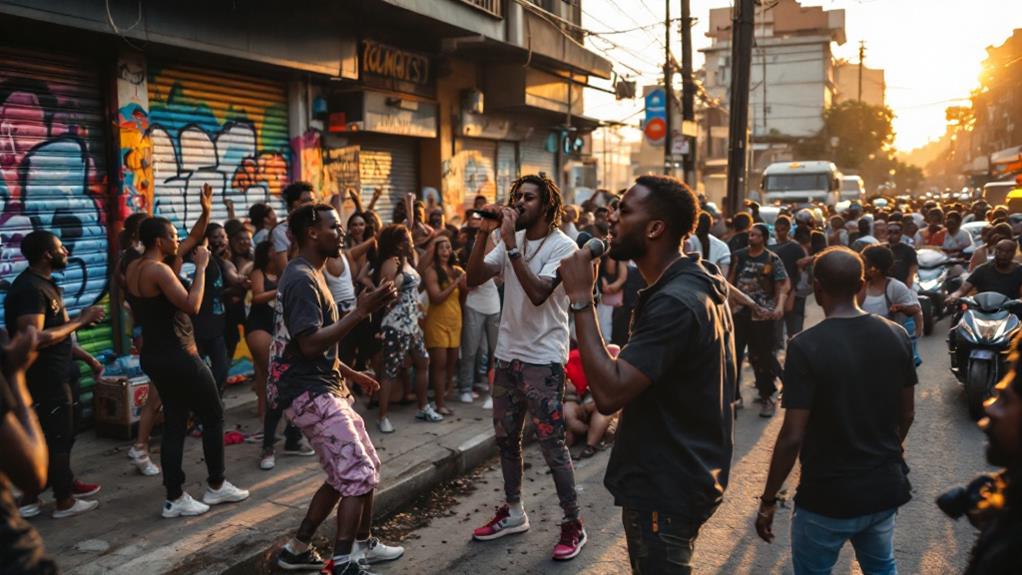
The street rap movement in Nigeria has revolutionized the country's hip-hop scene, bringing a fresh wave of energy and authenticity to the forefront. You'll find artists like Lil Kesh, Zlatan, Naira Marley, and Chinko Ekun at the helm of this change, infusing local lingo and sounds into their music to create a unique Nigerian rap style.
This evolution has spawned a "family tree" of street rappers, with heavyweights like Olamide, Falz, Zlatan, and Naira Marley consistently topping the charts. They've commanded the art of representing urban experiences and innovative hustles, resonating deeply with their audience.
As Nigerian rap continues to evolve, you'll notice a shift in its purpose. While political commentary once dominated, today's music focuses more on escapism and pleasure-seeking. This change has coincided with the rise of Afrobeats, which has become a dominant force in the industry.
The democratization of Nigerian rap, led by M.I Abaga, has made the genre more accessible to mainstream audiences. You'll find rappers blending Americana with local elements, crafting a sound that speaks directly to the people's language and experiences.
Afrobeats and Rap Fusion
Innovation in Nigerian music has reached new heights with the fusion of Afrobeats and rap. This unique blend combines the infectious rhythms of Afrobeats with the lyrical prowess of rap, creating a genre-bending style that's captivating audiences worldwide. You'll find artists like Burna Boy, Wizkid, and Davido seamlessly transitioning between these genres, showcasing the versatility of Nigerian music.
This fusion has opened doors for Nigerian artists to engage with broader global audiences. Tracks like Burna Boy's "Ye" and Davido's "Fall" have become international hits, demonstrating the widespread appeal of this innovative sound. Producers have played a crucial role in shaping this fusion, blending traditional African rhythms with contemporary production techniques.
As you plunge into this dynamic musical landscape, you'll notice how the Afrobeats and rap fusion has paved the way for exciting collaborations between Nigerian artists and international stars. This cross-pollination of talent has further expanded the global reach and influence of Nigerian music. The result is a sonically diverse and innovative sound that's taking the world by storm, solidifying Nigeria's position at the forefront of global music trends.
Drill's Influence on Nigerian Hip-Hop
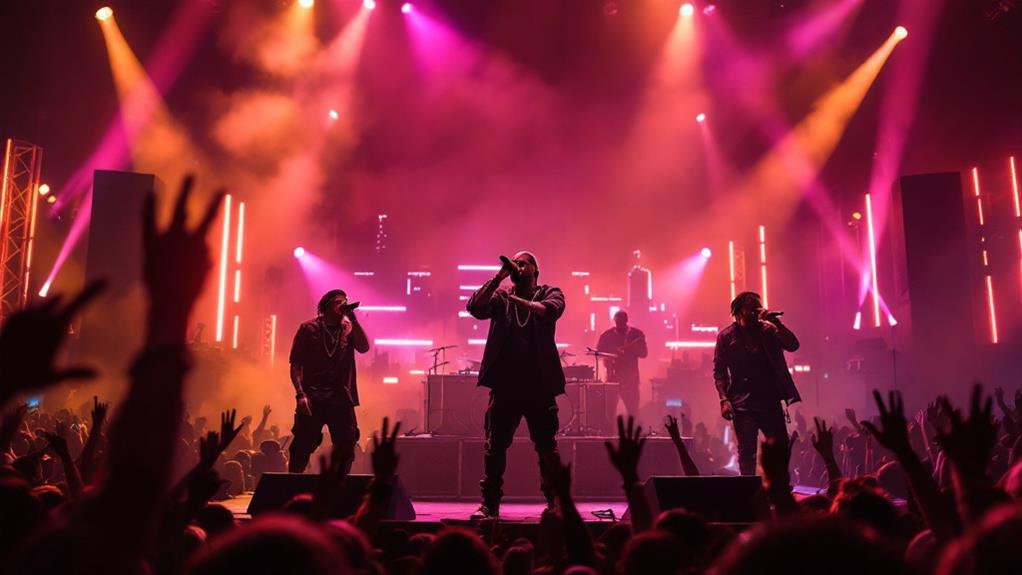
As Afrobeats and rap fusion continue to dominate the Nigerian music scene, a new sound has emerged from the streets: drill. This gritty and aggressive genre has taken root in Nigeria's burgeoning hip-hop scenery, with artists like Odumodublvck and Tomi Obanure leading the charge.
You'll find these drill artists blending elements of highlife and Afro-fusion with Nigerian Pidgin English, creating a unique sonic signature that reflects the frustrations of local communities. The raw energy of this new wave is on full display at Abuja's Ballroom event space, where the popular Capital Block Party showcases the talent of young Nigerian rappers.
While Afrobeats has captured global attention, Nigerian drill has become an outlier, attracting a dedicated following among the country's youth. Odumodublvck and Tomi Obanure have gained international recognition for their uncompromising and socially conscious lyrics, often challenging the government and police.
This emerging drill scene represents a bold new direction for Nigerian hip-hop, offering a platform for artists to express their experiences and concerns through hard-hitting beats and unapologetic rhymes. As the genre continues to evolve, it's clear that drill is making its mark on Nigeria's rich musical scenery.
Female Voices in Nigerian Rap
Breaking through barriers and shattering stereotypes, female voices in Nigerian rap have emerged as a powerful force in the industry. You'll find these artists blending genres and pushing boundaries, creating a unique sound that's captivating listeners worldwide.
Take Ayra Starr, for instance. This young prodigy has quickly risen to prominence with her distinctive style that fuses Afrobeats, R&B, and hip-hop. Her inspiring lyrics and confident delivery have made her a standout in the Nigerian rap scene.
Niniola, known primarily for her Afro-house and Afrobeats tracks, has also made waves in the rap world. Her versatility shines through as she showcases her lyrical prowess, proving that she's a force to be reckoned with across multiple genres.
You can't ignore the impact of other female artists like Tems and Lady Donli. Tems' soulful, genre-blending sound and Lady Donli's poetic, introspective lyricism have both earned critical acclaim and expanded the boundaries of Nigerian rap.
The collaboration between male and female artists, like Falz's work with Simi and Cuppy, further highlights the growing prominence of women in Nigerian rap. These partnerships create genre-bending tracks that celebrate women's contributions to the industry.
Global Impact and Future Trends
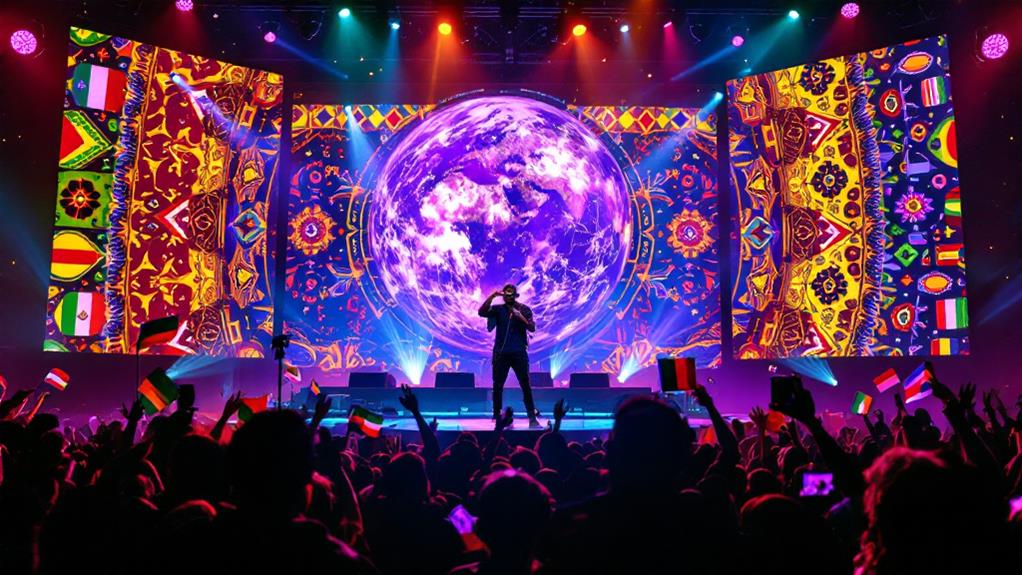
The global reach of Nigerian rap has expanded exponentially in recent years, altering the genre from a local phenomenon to an international sensation. You'll find artists like Burna Boy headlining major events worldwide, showcasing the unique blend of Afrobeats and hip-hop that defines Nigerian rap. This fusion has created a sound that resonates with audiences across cultures, bridging the gap between local influences and global appeal.
As you investigate the Nigerian rap scene, you'll notice a new generation of artists pushing boundaries and experimenting with different styles. They're collaborating with international acts and leveraging social media to build global fan bases. This digital-first approach has allowed emerging talent to showcase their skills on a worldwide stage.
Looking ahead, you can expect Nigerian rap to continue evolving. Industry experts predict more cross-cultural collaborations and innovative production techniques. You'll likely see the genre further integrate into the mainstream global music landscape, with Nigerian artists shaping the future of hip-hop. As the sound continues to captivate listeners worldwide, Nigerian rap is primed to remain a dominant force in the music industry for years to come.
